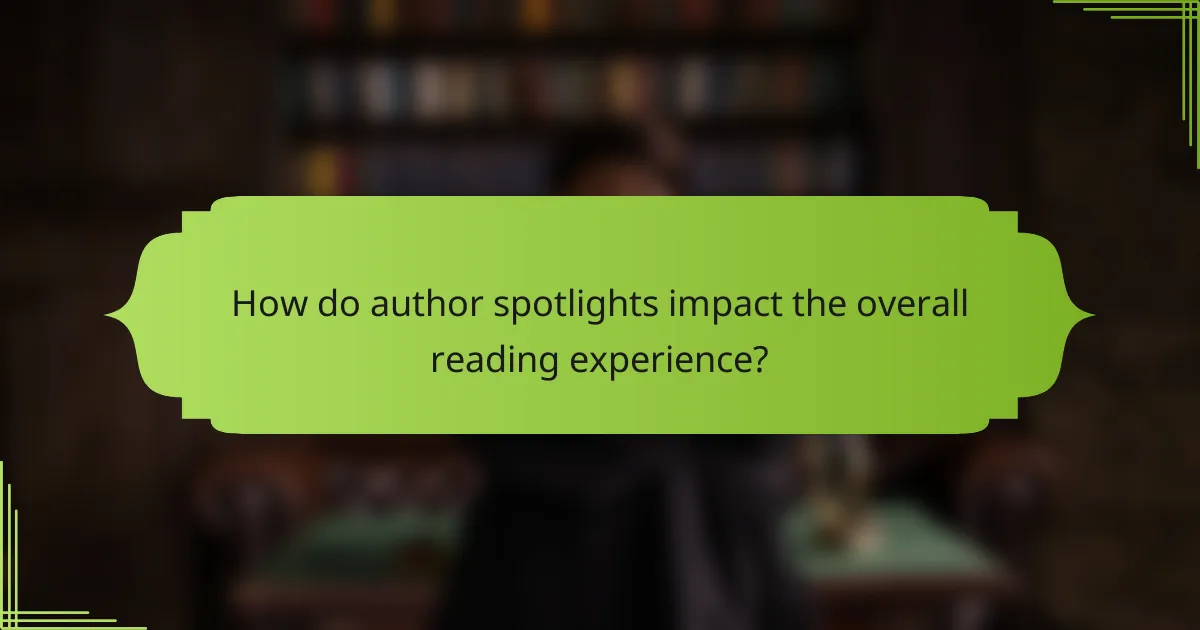Author spotlights can significantly enhance book club interactions by fostering deeper connections between readers and writers. Engaging with authors allows members to ask questions directly, clarifying themes and character motivations. Various formats, such as live Q&A sessions and recorded interviews, enrich discussions and provide unique insights. Overcoming scheduling challenges and ensuring clear communication can maximize these enriching experiences.

How can author spotlights enhance book club discussions?
Author spotlights can significantly enhance book club discussions by providing deeper insights into the author’s intentions and writing processes. Engaging with the author fosters a personal connection, enriching the reading experience.
Inviting authors to participate allows members to ask questions directly, clarifying themes and character motivations. This interaction can lead to a more dynamic exchange of ideas and interpretations among club members.
Moreover, author spotlights can introduce unique perspectives that challenge preconceived notions, stimulating thoughtful debates. These discussions can deepen understanding and appreciation of the book, making the reading experience more fulfilling.
Finally, incorporating author insights can also inspire members to explore other works by the same writer, expanding their literary horizons.
What are the key benefits of inviting authors to book clubs?
Inviting authors to book clubs enhances interactions by providing unique insights and fostering deeper discussions. Authors share their creative processes and intentions, enriching members’ understanding of the text. This direct engagement creates a personal connection, making the reading experience more meaningful. Additionally, author participation can stimulate interest in the book, encouraging members to explore related works.
How do authors influence reader engagement and interpretation?
Authors significantly enhance reader engagement and interpretation through direct interactions and personalized insights. Inviting writers to book clubs fosters deeper discussions and emotional connections. This approach allows readers to explore themes and characters from the author’s perspective, enriching their understanding. Studies show that author participation can increase discussion frequency by up to 50%, highlighting the unique impact of direct engagement. Additionally, readers often report a heightened appreciation for the narrative, as they gain insights into the creative process and intentions behind the work.

Which types of authors are most effective in book club settings?
Authors who engage readers and foster discussion are most effective in book club settings. Notable types include local authors, who provide personal insights, and genre specialists, who deepen understanding of specific themes. Additionally, authors with interactive styles encourage audience participation, enhancing the overall experience.
What characteristics make an author appealing to book clubs?
Authors appealing to book clubs often possess engaging storytelling skills, relatable themes, and strong communication. Their ability to evoke discussion enhances the reading experience. Unique attributes like personal anecdotes or diverse backgrounds can further captivate members. Additionally, authors who actively participate in book club events create a memorable connection.
How do regional preferences shape author selection?
Regional preferences significantly influence author selection by aligning writers with local interests and cultural contexts. Book clubs often seek authors who resonate with their community’s values, ensuring discussions are relevant and engaging. For instance, a club in a coastal area may prefer authors who explore maritime themes, while a group in a rural setting might lean towards stories reflecting agricultural life. This targeted approach enhances reader connection and fosters deeper interactions during discussions. Ultimately, understanding regional tastes helps book clubs curate author spotlights that enrich their collective reading experience.

What formats can author interactions take during book club meetings?
Author interactions during book club meetings can take various engaging formats. These include live Q&A sessions, virtual meet-and-greets, recorded video messages, and written interviews. Each format enhances the reading experience by providing insights directly from the authors. For example, live Q&A sessions allow readers to ask questions in real-time, fostering a dynamic discussion. Virtual meet-and-greets can create a personal connection, while recorded messages offer convenience for busy schedules. Written interviews serve as a lasting resource for discussion points. Each format can uniquely enrich the book club experience, encouraging deeper exploration of the text.
How can virtual author visits be organized effectively?
Virtual author visits can be organized effectively by planning logistics, engaging the audience, and utilizing technology. First, select a suitable platform that allows for interactive sessions. Next, coordinate the author’s availability and promote the event through social media and newsletters. Encourage participants to prepare questions in advance to facilitate discussion. Finally, follow up with a feedback survey to improve future events.
What are the advantages of in-person author events?
In-person author events significantly enhance book club interactions by fostering direct engagement between readers and writers. These events create opportunities for meaningful discussions, allowing readers to ask questions and gain insights into the author’s creative process.
Additionally, personal interactions can deepen emotional connections to the book, enriching the overall reading experience. Authors can share unique stories behind their work, providing context that may not be evident through the text alone.
Moreover, these events often lead to increased enthusiasm for reading and writing within the community. Participants may feel inspired to explore new genres or even pursue their own writing projects after interacting with authors.
In summary, in-person author events elevate book club dynamics, promote community engagement, and inspire creativity among readers.

What challenges do book clubs face when coordinating with authors?
Book clubs face challenges in coordinating with authors due to scheduling conflicts, communication barriers, and varying expectations. Authors may have limited availability, making it difficult to align schedules for discussions. Additionally, misunderstandings can arise regarding the format and nature of interactions, leading to dissatisfaction. Clear communication and flexibility are essential to overcome these obstacles.
How can logistical issues be overcome for author participation?
Logistical issues for author participation can be overcome by implementing clear communication, flexible scheduling, and utilizing technology. Establishing a dedicated point of contact ensures authors are informed and engaged. Scheduling virtual events accommodates diverse time zones, enhancing participation. Tools like video conferencing and social media facilitate real-time interactions, making it easier for authors to connect with book clubs.
What common misunderstandings occur between authors and book clubs?
Common misunderstandings between authors and book clubs include misaligned expectations and communication gaps. Authors often expect deep engagement and analysis, while book clubs may focus on casual discussion. Additionally, authors might assume their work is universally understood, overlooking diverse interpretations. Miscommunication can arise from differing priorities, such as authors seeking promotion versus book clubs desiring enriching conversations. Understanding these dynamics can enhance interactions and foster better relationships between authors and readers.

How do author spotlights impact the overall reading experience?
Author spotlights significantly enhance the reading experience by fostering engagement and deeper connections. These interactions allow readers to gain insights into the author’s creative process and motivations, enriching discussions within book clubs. Author spotlights can lead to unique experiences, such as Q&A sessions, which encourage participants to explore themes and characters more profoundly. As a result, readers often feel a stronger emotional connection to the material, enhancing overall enjoyment and understanding.
What unique insights can authors provide about their works?
Authors provide unique insights about their works through personal anecdotes, thematic explorations, and character motivations. These perspectives deepen readers’ understanding and foster richer discussions in book clubs. Engaging with authors can reveal hidden layers and intentions behind the narrative, enhancing the overall reading experience. Such interactions can also introduce exclusive behind-the-scenes details, making the book more relatable and memorable for readers.
How can authors help foster deeper connections among book club members?
Authors can enhance book club interactions by participating in discussions, sharing insights, and answering questions. This engagement fosters deeper connections among members. Inviting authors to book club meetings creates a unique opportunity for personalized dialogue, enriching the reading experience. Many readers appreciate understanding the author’s perspective, which can lead to more profound discussions about themes, characters, and narrative techniques. Author involvement can also stimulate interest in future readings, as members may feel more connected to the material.

What are the best practices for integrating author spotlights into book clubs?
Integrating author spotlights into book clubs enhances interactions by creating deeper connections between readers and writers. Here are best practices for effective integration:
1. Schedule live Q&A sessions with authors to allow members to engage directly.
2. Curate discussion questions that relate to the author’s background and writing process.
3. Share author interviews or videos to provide insights into their creative journey.
4. Encourage members to read multiple works by the author for a comprehensive understanding.
5. Facilitate themed discussions that connect the author’s themes to current events or personal experiences.
How can book clubs prepare for a successful author interaction?
Book clubs can prepare for successful author interactions by establishing clear communication and setting expectations. Prioritize creating a welcoming environment where authors feel comfortable sharing insights.
1. Research the author’s background and works to facilitate meaningful dialogue.
2. Prepare thoughtful questions that encourage in-depth discussions.
3. Promote the event to ensure good attendance and engagement.
4. Provide a platform for authors to share their experiences and connect with readers.
5. Follow up with feedback or thank-you notes to strengthen relationships.
These steps enhance the overall experience for both authors and book club members, fostering a vibrant literary community.
What common mistakes should be avoided when inviting authors?
To enhance book club interactions, avoid common mistakes when inviting authors by ensuring clarity, respect, and preparation. First, provide authors with clear expectations regarding their role and the event format. Next, respect their time by offering flexible scheduling options. Prepare thoughtful questions in advance to facilitate engaging discussions. Lastly, follow up with a thank you note, which fosters positive relationships for future interactions.